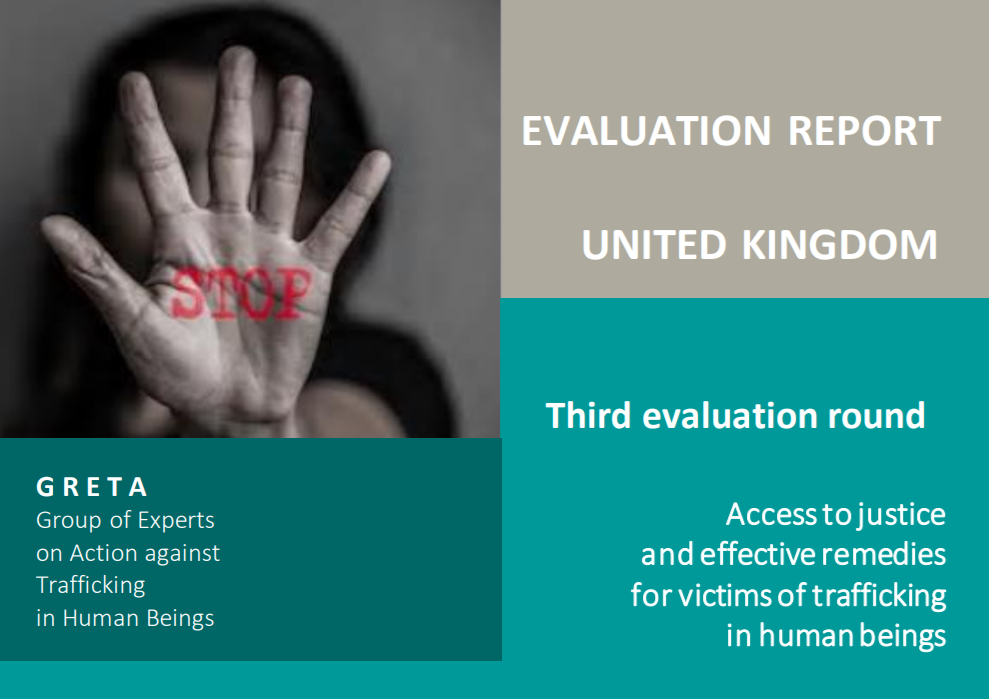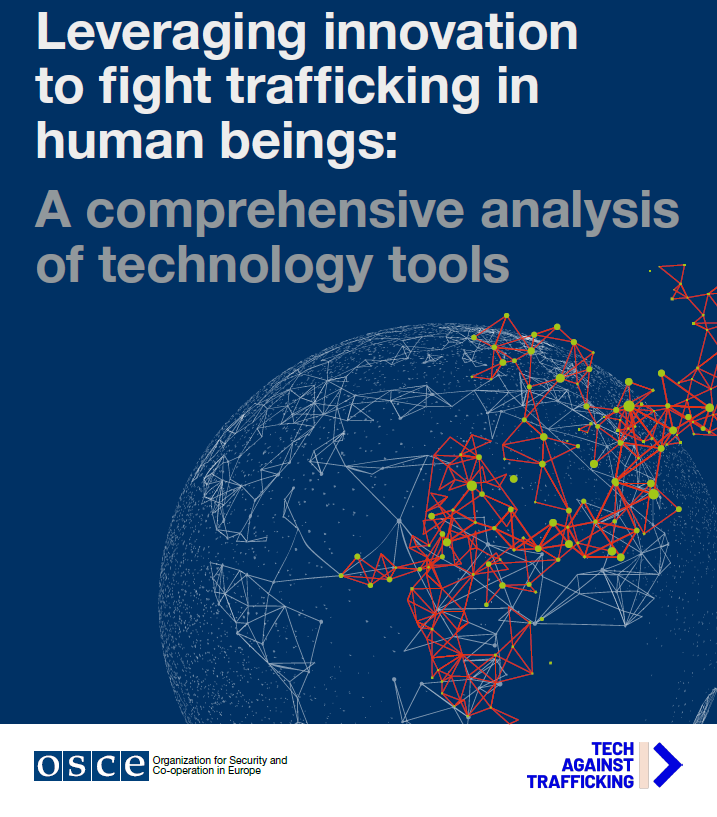The Council of Europe’s Group of Experts on Action against Trafficking in Human Beings (GRETA) has published its third report on the United Kingdom.
The core recommendation of the report is that the UK should improve the identification of trafficking victims. The report notes the low level of convictions compared to the number of identified victims, and highlights the effect of the cuts to funding for the criminal justice system and the resulting insufficient resources. Therefore, the report emphasis that free and timely legal aid should be provided to victims of human trafficking, whilst psychological assistance
For the full findings and recommendations please see the report here.
The Organization for Security and Co-operation in Europe (OSCE) published a report titled ‘Leveraging innovation to fight trafficking in human beings: A comprehensive analyses of technology tools’.
The aim of the report was to carry out an analysis of the technology tools used to combat human trafficking in the OSCE region and beyond, with the goal to aid stakeholders in engaging with technology strategically, raising awareness about tools to help their work and inspiring them to pursue future innovation.
The report notes that human traffickers make use of technology to their advantage whilst the same cannot be said of those responsible for combating human trafficking. The report identified that although some resources are dedicated to investigating human trafficking as cybercrime, much less resources have been dedicated to exploring ways in which technology can be used in positive ways to combat it. The report also found there was little “awareness of existing technology initiatives in the anti-trafficking field, which increases the risk of fragmented and disjointed development and use of technology-based tools.”
Therefore, the report bridges the information gap in the on the use of technology to combat trafficking, whilst 305 technology tools and initiatives addressing trafficking in human beings were identified during the research for the report.
Please see the report for full recommendations to governments and organisations, as well as for the detailed analysis of how different stakeholders, including law enforcement, civil society, businesses and academia can take advantage of technology to combat human trafficking.
Special Rapporteur on trafficking in persons, Maria Grazia Giammarinaro produced the June 2020 report “The impact and consequences of the COVID-19 pandemic on trafficked and exploited persons” tracking the impact of the Coronavirus pandemic on the most vulnerable communities.
Most significantly, pre-existing vulnerabilities to trafficking have been exacerbated by the extreme social and economic impacts of the pandemic. These include:
- Poverty and unemployment
- Migration, in changes in migration status, those on the migration journey and new restrictive migration policies
- Lack of services provided to victims of trafficking and re-victimisation
- The disruption of global supply chains
- Trafficking and exploitation of children
- Risks faced by victims and potential victims of sexual exploitation
The impact of the pandemic has negatively affected existing victims, as well as increasing the risk of others being preyed on by traffickers. It is clear that the COVID19 pandemic will have long term harmful impacts on exploited and trafficked persons, however the full impact is currently unfolding at yet to be determined.
Find the June 2020 report on the impact of COVID-19 pandemic on trafficked and exploited persons here. https://www.ohchr.org/Documents/Issues/Trafficking/COVID-19-Impact-trafficking.pdf
A report released last year by the Freedom Fund and John Jay College gives some of the first reliable estimates in relation to how many children are involved in the adult entertainment industry in Kathmandu. It has always been known that a significant number of young people and children work in the adult entertainment industry in Kathmandu, but until recently no reliable estimates existed as to the true scale of the problem.
The study found that approximately 1650 young people under the age of 17 are working in the adult entertainment industry, making up approximately 17% of those working in the industry. The study also found 62% of workers were working in the industry before the age of 18. The majority of underage workers in the adult entertainment industry were found to be working in sexually exploitative environments and 99% were considered to be held in the worst forms of child slavery as defined by the International Labour Organisation’s convention.
The full study can be found
here.
The Independent Review of the Modern Slavery Act 2015 has was published this week on the 22nd May 2019. The review has identified eighty recommendations for improvements to the operation of the act and wider policies to tackle modern slavery and human trafficking in the United Kingdom. The review makes significant recommendations for how legislation should be amended to increase compliance by businesses and improve supply chain transparency, including:
- Recommendation 25: Failure to fulfil modern slavery statement reporting requirements or to act when instances of slavery are found should be an offence under the Company Directors Disqualification Act 1986.
- Recommendation 22: The legislation should be amended to require companies to consider the entirety of their supply chains [in respect of modern slavery]. If a company has not done so, it should be required to explain why it has not and what steps it is going to take in the future.
- Recommendation 18: In section 54(5) ‘may’ should be changed to ‘must’ or ‘shall’, with the effect that the six areas set out as areas that an organisation’s statement may cover will become mandatory. If a company determines that one of the headings is not applicable to their business, it should be required to explain why.
- Recommendation 32: Section 54 should be extended to the public sector. Government departments should publish a [modern slavery] statement at the end of the financial year, approved by the Department’s board and signed by the Permanent Secretary as Accounting Officer. Local government, agencies and other public authorities should publish a statement if their annual budget exceeds £36 million.
The recommendations would significantly increase the responsibility on businesses to address anti-slavery in their supply chains, and afford the government greater power to punish companies that do not comply.
The full report can be found here.
The Airports Council International have released the first edition of their handbook to help combat human trafficking. The handbook provides a variety of case studies of the work airports are carrying out in the anti-trafficking sector as well as providing an overview of the nature of human trafficking and modern slavery itself, including the types and forms of exploitation it can take.
The handbook includes sections on:
- Introduction: overview of human trafficking and the role airports can play in combating it.
- Guidance: spotting the signs of human trafficking in airports and how to respond.
- Staff Awareness: specific issues relating to staff awareness of human trafficking.
- Public Awareness: Information on campaigns, partnerships , and awareness raising of human trafficking.
- Case Studies
- Appendices: Law and policy instruments and resources.
The full handbook can be accessed here.
The Centre for the Study of Democracy has released a paper looking at human trafficking within the EU and how it can be best understood by placing the financial proceeds of human trafficking at the centre of analysis. The paper recognises that there are substantial gaps in knowledge surrounding finances in trafficking in human beings in the EU, and this in part stems from local level law enforcement lacking specific experience in dealing with organised crime finances.
The report is broken into five main sections, including:
- A general overview of the state of criminal money management (CMM), and CMM within the specific context of human trafficking.
- Contemporary trends and market structures for human trafficking in the EU countries studied.
- The role money has to play in human trafficking.
- The role and implications ICT has for human trafficking.
- Survey of the role money laundering investigations can have in tackling trafficking in human beings.
The report concludes by summarising the main findings from each section and making policy recommendations for future research and practice.
Access to the full paper can be found here.
The Freedom Fund have published a paper reviewing the use of Behaviour Change Campaigns, which have been used in healthcare and development sectors to try and influence and transform the behaviour of individuals. The paper reviews Behaviour Change Campaigns which have targeted issues such as child abuse, violence against women, and sexual violence in an effort to develop a future campaign that might tackle modern slavery and child sexual exploitation in Kathmandu. This paper has drawn on 28 different studies.
The paper has reached several conclusions. The main findings are:
- The focus needs to be on injunctive not descriptive norms;
- Behaviour Change Campaigns are effective in a wide variety of mediums. However, this is not to say that they will be effective in every medium and context.
- Campaigns often succeed in bringing about positive change in the targeted individuals. However, there is some evidence that adverse effects can result.
- Evaluation must be embedded from the onset of the Behavioural Change Campaign. Since Behaviour Change Campaigns can have adverse effects the continual effectiveness of the campaign must be subject to constant evaluation.
The report was released in January 2019, and can be found here.
Technology, communications, and data are being increasingly used for the purposes of combating human trafficking and modern slavery. A new paper by Liberty Shared considers the strengths and limitations of different data sources and methodologies of data collection, with a particular focus on ‘big data’ and ‘thick data’. It notes that the effective gathering and analysing of data has a vital role in understanding and tackling major societal issues such as modern slavery. The report also looks at partnerships that can combine with differing tools of data collection and communication to maximise the impact of different organisations with varied strengths and capabilities.
The report also makes note of the need for public-private sector collaborations, and explores how both sectors will stand to benefit greatly in their anti-trafficking and anti-slavery efforts from these partnerships.
The full paper can be found here.

